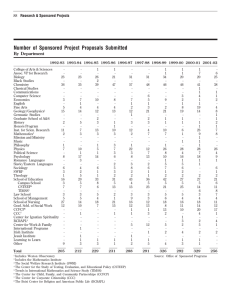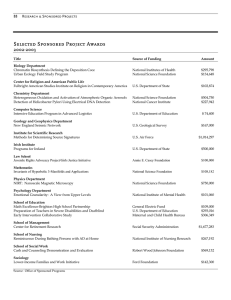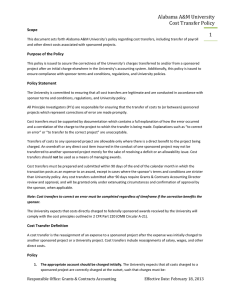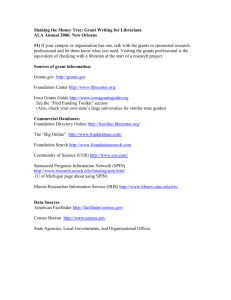COST TRANSFER PROCEDURES FOR SPONSORED ACTIVITIES PURPOSE
advertisement
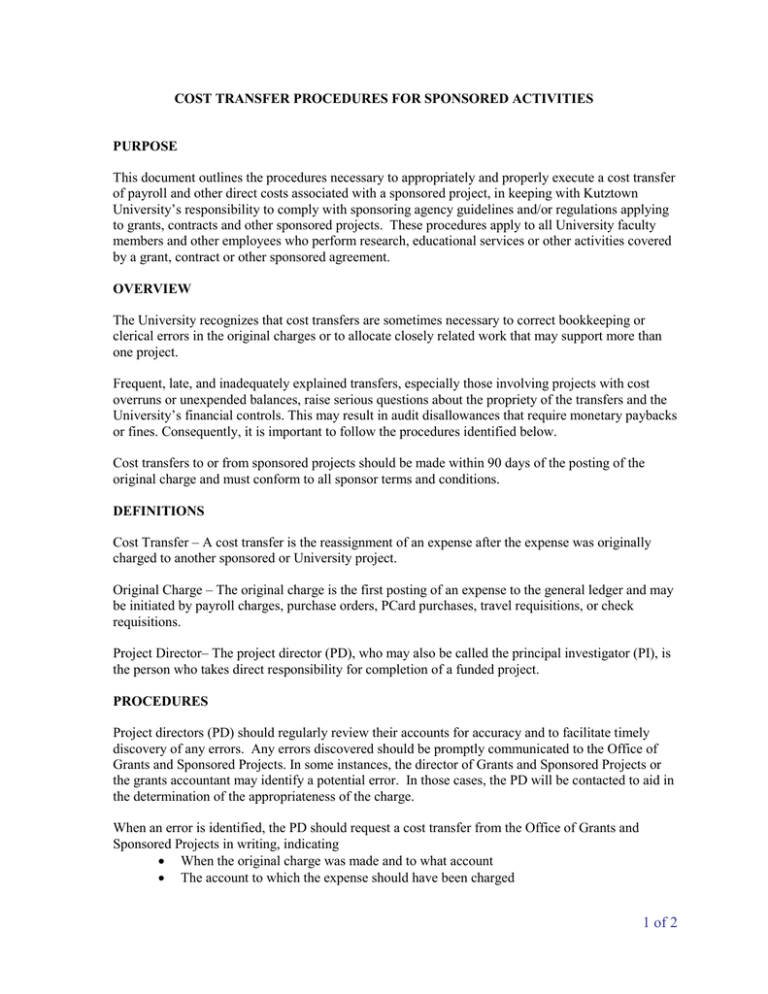
COST TRANSFER PROCEDURES FOR SPONSORED ACTIVITIES PURPOSE This document outlines the procedures necessary to appropriately and properly execute a cost transfer of payroll and other direct costs associated with a sponsored project, in keeping with Kutztown University’s responsibility to comply with sponsoring agency guidelines and/or regulations applying to grants, contracts and other sponsored projects. These procedures apply to all University faculty members and other employees who perform research, educational services or other activities covered by a grant, contract or other sponsored agreement. OVERVIEW The University recognizes that cost transfers are sometimes necessary to correct bookkeeping or clerical errors in the original charges or to allocate closely related work that may support more than one project. Frequent, late, and inadequately explained transfers, especially those involving projects with cost overruns or unexpended balances, raise serious questions about the propriety of the transfers and the University’s financial controls. This may result in audit disallowances that require monetary paybacks or fines. Consequently, it is important to follow the procedures identified below. Cost transfers to or from sponsored projects should be made within 90 days of the posting of the original charge and must conform to all sponsor terms and conditions. DEFINITIONS Cost Transfer – A cost transfer is the reassignment of an expense after the expense was originally charged to another sponsored or University project. Original Charge – The original charge is the first posting of an expense to the general ledger and may be initiated by payroll charges, purchase orders, PCard purchases, travel requisitions, or check requisitions. Project Director– The project director (PD), who may also be called the principal investigator (PI), is the person who takes direct responsibility for completion of a funded project. PROCEDURES Project directors (PD) should regularly review their accounts for accuracy and to facilitate timely discovery of any errors. Any errors discovered should be promptly communicated to the Office of Grants and Sponsored Projects. In some instances, the director of Grants and Sponsored Projects or the grants accountant may identify a potential error. In those cases, the PD will be contacted to aid in the determination of the appropriateness of the charge. When an error is identified, the PD should request a cost transfer from the Office of Grants and Sponsored Projects in writing, indicating • When the original charge was made and to what account • The account to which the expense should have been charged 1 of 2 • • A justification that states the reason(s) that the expense was originally charged to the account from which it is now being transferred, why the charge needs to be transferred, and why the charge is allowable and allocable for the new account to be charged. Simply stating that a clerical or bookkeeping error is being corrected is not sufficient. An explanation (if applicable) as to why the cost transfer is being initiating more than 90 days after the original charge. The Office of Grants and Sponsored Projects will review the cost transfer request for completeness, compliance with sponsor and University terms and conditions/regulations, and allowability, allocability and reasonableness. Cost transfers that are determined to be appropriate will then be forwarded to the grants accountant. The grants accountant will confirm the original charge in SAP to verify the fund/cost center/GLA and amount. The grants accountant then initiates the debit and credit with a journal entry in SAP. Once the journal entry is posted, the grants accountant confirms the end result in SAP to verify that the general ledger is correct for both the credit and debit sides of the entry and electronically attaches any documentation to the journal entry in SAP. The person who initiated the transfer request and the Office of Grants and Sponsored Projects are then notified by email that the transaction has been completed. A hard copy of the journal entry and documentation are also filed to be reviewed monthly by an authorized University staff member. All supporting documentation for the cost transfer should be retained in accordance with the University’s record retention policy and/or sponsor requirements. ADDITIONAL INFORMATION Cost transfers are occasionally necessary between closely related projects. These requests must also contain proper justifications as outlined above and will be carefully reviewed. Cost transfers made only to cover apparent cost overruns or deplete unexpended balances will be carefully scrutinized and may not be allowed. 2 of 2

